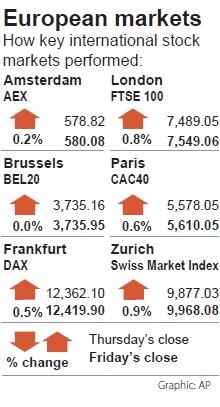Large-cap companies on Friday pulled European stocks higher as a surge in the UK’s Vodafone Group PLC and strong earnings for media businesses and Nestle SA spurred recovery from a sell-off driven by the European Central Bank (ECB).
The pan-European benchmark index rose 0.3 percent, bouncing back from its worst session in three weeks.
London’s FTSE 100 outperformed European peers with a 0.8 percent advance, helped by telecoms companies.

Vodafone gained 10.6 percent to record it strongest performance since late 2002 on plans to separate its towers unit in Europe into a new company worth upwards of 18 billion euros (US$20 billion) with a view to a potential stock market listing.
The STOXX 600 telecoms index rose 2.3 percent as shares of Cellnex Telecom SA, Europe’s biggest towers group, gained 3.3 percent and Telecom Italia SpA rose 4.1 percent after Vodafone agreed to jointly roll out 5G in Italy and merge their mobile mast operations.
However, media stocks led the gains after upbeat results from France’s Vivendi SA, satellite operator SES and education company Pearson Education.
Another blue-chip stock to perform well was Nestle, which rose nearly 2 percent after posting its fastest quarterly sales growth in three years.
“There has been a more positive set of corporate earnings since yesterday’s close and chiefly Vodafone,” City Index Group analyst Ken Odeluga said.
European shares took a beating on Thursday after ECB President Mario Draghi all but pledged to ease monetary policy further and even hinted at a reinterpretation of the bank’s inflation target, but disappointed some investors who had hoped for an immediate cut to interest rates.
Despite Thursday’s blip, the main STOXX index posted a 0.8 percent gain on the week, driven partly by hopes of policy easing from the ECB as economic data point to a worsening outlook for Europe’s already slowing economy.
“There is a bit of reassessment and the market has attracted some buyers back due to the big selling yesterday,” Odeluga said.
“We also had the US GDP [data], which was not as bad as expected and allows investors to go into the weekend with a bit more positive sentiment,” he said.
US data showed that economic growth slowed less than expected in the second quarter, although it did little to deter expectations that the US Federal Reserve will cut interest rates by 25 basis points next week.
Among the weak spots, Banco Sabadell SA and CaixaBank SA fell more than 6.5 percent.
Luxury stock Kering SA slumped 7 percent as its main Gucci brand reported a slower-than-expected rise in second-quarter sales, hit by a blip in the US.

Sweeping policy changes under US Secretary of Health and Human Services Robert F. Kennedy Jr are having a chilling effect on vaccine makers as anti-vaccine rhetoric has turned into concrete changes in inoculation schedules and recommendations, investors and executives said. The administration of US President Donald Trump has in the past year upended vaccine recommendations, with the country last month ending its longstanding guidance that all children receive inoculations against flu, hepatitis A and other diseases. The unprecedented changes have led to diminished vaccine usage, hurt the investment case for some biotechs, and created a drag that would likely dent revenues and

Global semiconductor stocks advanced yesterday, as comments by Nvidia Corp chief executive officer Jensen Huang (黃仁勳) at Davos, Switzerland, helped reinforce investor enthusiasm for artificial intelligence (AI). Samsung Electronics Co gained as much as 5 percent to an all-time high, helping drive South Korea’s benchmark KOSPI above 5,000 for the first time. That came after the Philadelphia Semiconductor Index rose more than 3 percent to a fresh record on Wednesday, with a boost from Nvidia. The gains came amid broad risk-on trade after US President Donald Trump withdrew his threat of tariffs on some European nations over backing for Greenland. Huang further

CULPRITS: Factors that affected the slip included falling global crude oil prices, wait-and-see consumer attitudes due to US tariffs and a different Lunar New Year holiday schedule Taiwan’s retail sales ended a nine-year growth streak last year, slipping 0.2 percent from a year earlier as uncertainty over US tariff policies affected demand for durable goods, data released on Friday by the Ministry of Economic Affairs showed. Last year’s retail sales totaled NT$4.84 trillion (US$153.27 billion), down about NT$9.5 billion, or 0.2 percent, from 2024. Despite the decline, the figure was still the second-highest annual sales total on record. Ministry statistics department deputy head Chen Yu-fang (陳玉芳) said sales of cars, motorcycles and related products, which accounted for 17.4 percent of total retail rales last year, fell NT$68.1 billion, or

MediaTek Inc (聯發科) shares yesterday notched their best two-day rally on record, as investors flock to the Taiwanese chip designer on excitement over its tie-up with Google. The Taipei-listed stock jumped 8.59 percent, capping a two-session surge of 19 percent and closing at a fresh all-time high of NT$1,770. That extended a two-month rally on growing awareness of MediaTek’s work on Google’s tensor processing units (TPUs), which are chips used in artificial intelligence (AI) applications. It also highlights how fund managers faced with single-stock limits on their holding of market titan Taiwan Semiconductor Manufacturing Co (TSMC, 台積電) are diversifying into other AI-related firms.